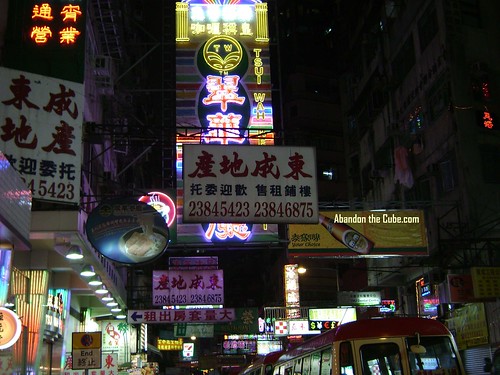Shenzhen to Hong Kong Border
Traveling to Hong Kong when working for a Chinese company can prove to be a rather tiresome task. However, I have heard of several western businesses traveling in this manner. The manner in which I am asked to travel is sometimes completely beyond my understanding but it always is becomes a very interesting experience full of excitement, complications, and stressful situations. My company is constantly trying to “cut corners,” so to speak, and in the end spend much more money through these attempts.
Usually I am asked not to fly directly to Hong Kong because it is extremely expensive. The reasons as to why flights from Shanghai to Hong Kong are considered international flights are money, the SAR (Special Authority Region) status that Hong Kong has maintained even after the 1997 turnover to China, and that China has signed a non-interference agreement with Britain / Hong Kong.
Hong Kong is politically part of China, but like other SAR and AR (Autonomous Regions) in China such as Xinjiang, Xizang (Tibet), and Inner Mongolia – which have existed independently for thousands of years, or in this case, 99 years under a treaty with Great Britain, the dissimilarities that exists between the mainland and these areas are immense. Even 11 years after the turnover, the Chinese authorities have surprisingly not intervened in Hong Kong. Besides the wide circulation and acceptance of only Hong Kong Dollars (HKD) and not Chinese RMB in most establishments, the fact that one crosses a “border” when entering and exiting Hong Kong, and that mobile phone networks from the mainland do not work or are charged international roaming fees, are solid examples of their semi-solidarity. I also believe that many Hong Kong citizens have a disenchanted or skeptical view towards the mainland. When asked about my employment with a Chinese company, many Hong Kong locals have responded, usually in perfect English, “you must be very angry and annoyed frequently while working for a Chinese company.” I will leave my response up to the interpretation of the reader.
Flying into Shenzhen is considerably less expensive than direct flights into Hong Kong. However, the land border crossing and shuttle bus back and forth can be extremely time-consuming. A shuttle bus from the Shenzhen airport arrives at the customs center near the international border crossing. All passengers have to carry all other luggage into the exit compound. After receiving some particularly annoying “foreign treatment,” you are ushered through the gate and board another bus outside the gate. This bus drives less than 10 minutes and arrives at the Hong Kong clearance compound. Once again, you have to take all of your bags off the bus and get clearance into Hong Kong. Then, you board a completely different bus and drive into Hong Kong. After almost two hours, you arrive at the destination you could have flown directly. Then, even though you have to go to a trade show near the Hong Kong airport, you have to stay in a hotel in Kowloon because it is also cheaper. After dealing with phone calls from your boss for not checking your email because the crappy hotel you stayed in doesn’t’ have internet services, you have a take the subway and walk to a bus center to take you back to the trade expo center one hour away every day.
In a poor attempt to save money, the company spent more on paying a salary while I was traveling and placing me in a hotel with no internet connection from which I could not perform my duties. This lack of foresight and logic is widespread throughout Chinese companies in my experiences. Although anecdotal, I have witnessed these events repeatedly and feel safe in generalizing, however many of these things are simply cultural. If you would like to save money by taking this route, I urge you to consider the time you are wasting while attempting to save money.
-Posted by Mike.














